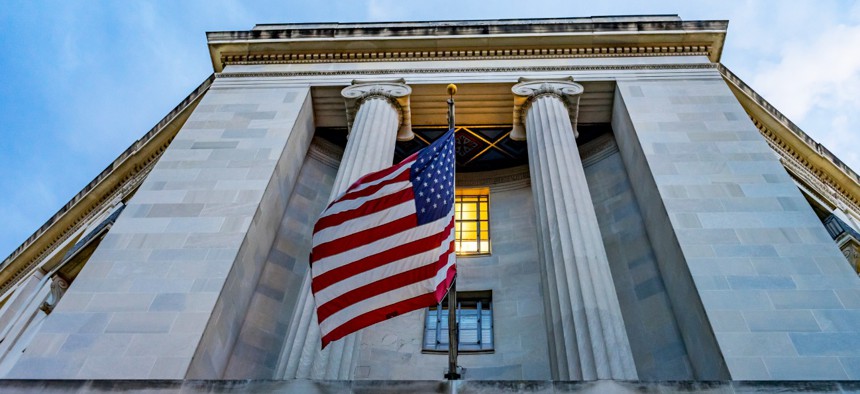
Justice Department headquarters in Washington. bpperry / istock
President’s Authority Over DOJ Jeopardizes Independence
How much influence should a president have over the Justice Department? The answer is central to the success of America’s democratic experiment.
According to recent reports, in 2018, President Donald Trump ordered the Justice Department to subpoena Apple for records on his then-White House counsel, Don McGahn, who at the time had recently refused to help remove then-Special Counsel Robert Mueller, who had been appointed to investigate possible connections between Trump’s 2016 campaign and the Russian government.
Despite insistence by Attorney General Merrick Garland that “political or other improper considerations must play no role in any investigative or prosecutorial decisions,” the Justice Department can never be fully insulated from political influence as long as the president—an inherently political figure—is empowered to hire and fire Justice Department appointees.
The Illusion of Independence
After Watergate, Congress considered legislation to make the Justice Department into an independent agency so as to address some of the abuses from the Nixon era. Eventually, however, Congress agreed to a more modest reform bill, the Ethics in Government Act of 1978, which created the Office of Independent Counsel.
By 1999, the Ethics in Government Act, which had a "sunset" provision, needed to be renewed. At that point, however, both the Republican and Democratic political parties had been embarrassed by prior independent counsel investigations: Republicans were still reeling from the Iran–Contra affair, while Democrats had been humiliated by the Clinton–Lewinsky scandal. As such, both parties decided to simply let the Ethics in Government Act expire, thereby ending the Office of Independent Counsel.
Later that year, then Attorney General Janet Reno promulgated regulations authorizing the appointment of special counsels, which could serve a role similar to independent counsels. Notably, however, unlike independent counsels, which were authorized by an Act of Congress, special counsels are authorized by the Justice Department itself. As such, whereas presidents statutorily had limited influence over independent counsels, they do have the power to remove special counsels.
Trump, McGahn and Mueller
In 2017, President Donald Trump fired FBI Director James Comey. Just a week prior, Comey testified before the Senate Judiciary Committee that the FBI had begun investigating possible collusion between the Russian government and Trump associates. Following Comey's dismissal, Robert Mueller was appointed as special counsel by Deputy Attorney General Rod Rosenstein, who was acting on behalf of Attorney General Jeff Sessions, who had previously recused himself from any Trump-related investigations
In January 2018, The New York Times reported that Trump had, based on confidential sources, ordered McGahn to have the Justice Department remove Mueller. McGahn, however, refused.
According to the Mueller Report, in response to The New York Times article, Trump “wanted McGahn to put out a statement denying that he had been asked to fire the Special Counsel.” To this request, McGahn, also refused.
The Mueller Report goes on to detail how Trump complained to those in his orbit that McGahn was a liar who had “leaked to the media to make himself look good.”
Recently, it has been revealed that in February 2018, Trump had the Justice Department secretly subpoena Apple for information related to McGahn. John Dean, ex-White House counsel to former president Richard Nixon, has since described Trump’s efforts to use the Justice Department for personal gain as “Nixon on stilts and steroids.”
A Unitary Executive?
McGahn’s tenure as White House counsel ended October 2018. In April 2019, shortly after the release of the Mueller Report, the Democratic-led House Judiciary Committee subpoenaed McGahn to “help shed further light on the President's attacks on the rule of law.” However, the Trump White House sought to block McGahn from appearing, which led to a 2-year legal battle. Last month, McGahn did ultimately testify, during which he affirmed that Trump had tried to enlist his help in ousting Mueller.
Article Two of the U.S. Constitution states that “executive Power shall be vested in a President of the United States of America,” and as such, proponents of the unitary executive theory claim that presidents have total authority over the executive branch. Trump’s firing of Comey, his attempt to fire Mueller, and his sudden announcement—via tweet—that McGahn would be leaving a few months after refusing to help fire Mueller, suggests that Trump, not unlike Nixon, bought into the promise of unbounded presidential power as provided for by the (not universally accepted) unitary executive theory.
In contrast, President Joe Biden has a long history of supporting the idea of shared executive power. Under his leadership, the Justice Department appears to be ending its practice of using subpoenas to obtain records in an effort to identify confidential sources. However, even if such reforms do come to pass, Justice Department policies can change with the whims of the White House.
Unlike state justice departments, which are often headed by an individual not answerable to the governor, the federal Justice Department is only ever “independent” of the president to the extent that there are a sufficient number of principled individuals willing to risk getting fired by refusing to cooperate with the president. This is not a system that adequately discourages abuses of power.
Joshua Holzer is an assistant professor of political science at Westminster College in Fulton, Missouri.






